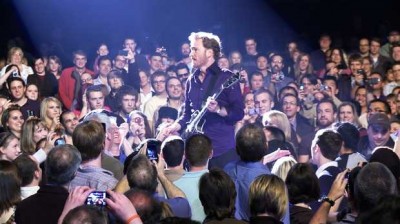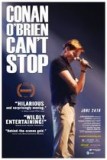| Reviews & Columns |
|
Reviews DVD TV on DVD Blu-ray 4K UHD International DVDs In Theaters Reviews by Studio Video Games Features Collector Series DVDs Easter Egg Database Interviews DVD Talk Radio Feature Articles Columns Anime Talk DVD Savant Horror DVDs The M.O.D. Squad Art House HD Talk Silent DVD
|
DVD Talk Forum |
|
|
| Resources |
|
DVD Price Search Customer Service #'s RCE Info Links |
|
Columns
|
|
|
Conan O'Brien Can't Stop

In explaining the concert tour that is the subject of the new documentary Conan O'Brien Can't Stop, the comic muses, "Really, my main goal for this is to have fun." Behind the camera, director Rodman Flender asks, "Do you think you could have fun without an audience in front of you?" O'Brien does not answer. He doesn't have to.
The tour came about when O'Brien walked away from The Tonight Show after only seven months, following NBC's protracted attempt to reinstate his predecessor, Jay Leno. (Perhaps you heard about it). Forbidden from appearing on television, radio, or the web for six months as part of his contract buy-out, O'Briend decided to take his show on the road, embarking on the 30-city "Legally Prohibited from Being Funny on Television Tour."
Flender and a crew came along, and frankly, from a technical standpoint, the results are almost a home movie. But the picture benefits from that low-fi intimacy, catching private moments, candid confessions, and the slowly overpowering grind of tour life--the rehearsals, the travel, the endless barrage of meet-and-greets, the highs and the lows.
L'affaire Tonight reached such a boiling point of media saturation that the film--and O'Brien--risks tipping too far into the realm of self-pity. "I'm really angry at times," O'Brien confesses. "Sometimes I'm so mad I can't even breathe." But he's not a wallower; he seldom talks about Lenogate explicitly, and shrugs off comments on it by fans. However, one of the few times it does come up directly provides one of the film's funniest moments, when a backstage reading of congratulatory telegrams yields one from "Jay Leno," who asks, "What's it like to have a soul?"
Most of the time, if he is angry (and he doesn't seem to be, all that often), he takes it out on himself, suffering from the common comic's affliction of "inherent neediness." After a particularly good show, for example, he receives a compliment, but confides to the camera, "That's me--whenever someone tells me it was amazing, I wonder what was wrong with the other ones."
Again, this is nothing new; the self-doubting, insecure comedian is something we've seen before, though seldom with this kind of up-close perspective. What separates Conan O'Brien Can't Stop from other comic profiles or tour documentaries is that, quite simply, it's very, very funny--a perfect vehicle for O'Brien's responsive, off-the-cuff wit. Arriving at the deserted airport of their first city, O'Brien immediately barks, "Push this crowd back!" When bagpipes play at his college reunion, he notes of the sound, "Why do I always feel like a fireman died?" He plays Bonnaroo, but the A/C breaks down in the "comedy tent," creating an atmosphere akin to "a Native American sweat lodge"--"In six months," he tells the crowd, "I've gone from hosting The Tonight Show to performing at a refugee camp." And then there is his constant back-and-forth with his assistant Sona, who is nearly as good a foil as Andy.
Throughout Conan O'Brien Can't Stop, Flender gets at the psychological story--who O'Brien is, why he went through what he went through, and how he used this tour as a therapeutic reconnection to his audience. What he doesn't really delve into (disappointingly) is the sociological side of the story: what the Tonight Show flap tells us about the current (and frantic) state of the entertainment business, about the readjustment, at this very moment, of the popular culture metrics. That's a lot to ask, of course (and even Bill Carter's excellent book on the matter, The War for Late Night, barely scratched that surface). What Flender's film is, above all, is funny--and that seems to be its primary goal.
Jason lives in New York. He holds an MA in Cultural Reporting and Criticism from NYU.
|
| Popular Reviews |
| Sponsored Links |
|
|
| Sponsored Links |
|
|
| Release List | Reviews | Shop | Newsletter | Forum | DVD Giveaways | Blu-Ray | Advertise |
|
Copyright 2024 DVDTalk.com All Rights Reserved. Legal Info, Privacy Policy, Terms of Use,
Manage Preferences,
Your Privacy Choices | |||||||











